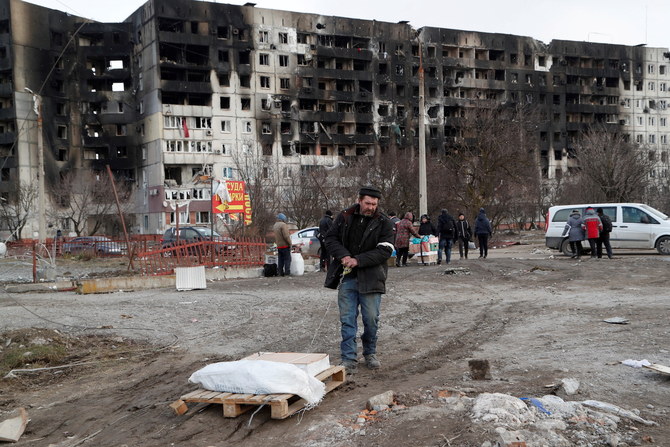KYIV/LVIV: Rescue workers on Thursday dug survivors out of the rubble of a theater in the besieged city of Mariupol which Ukraine said had been hit by a Russian air strike as people sheltered there from bombardments.
Russia denied striking the theater. But Ukraine’s capital Kyiv came under renewed Russian shelling on Thursday as the war entered its fourth week. Western sources and Ukrainian officials said Russia’s assault had stalled.
Officials from both sides meanwhile met again for peace talks, but they said their positions remained far apart.
Mariupol, a southern port city, has suffered the worst humanitarian catastrophe of the war, with hundreds of thousands of civilians trapped in basements with no food, water or power as Russian forces pound it with artillery fire and air strikes.
City authorities said they were still not able to estimate the number of possible casualties from Wednesday’s alleged air strike on the theater.
“Yesterday and today, despite continuous shelling, rubble is being cleared as much as is possible and people are being rescued. Information about victims is still being clarified,” the city council said in a statement. It provided no figures on the numbers rescued.
Commercial satellite pictures showed the word “children” had been marked out on the ground in front of the building before it was hit.
Russian foreign ministry spokeswoman Maria Zakharova said the allegation that Russia had bombed the theater was a “lie.”
“Russia’s armed forces don’t bomb towns and cities,” she told a briefing.
Mariupol city council later said more than 350,000 people were still sheltering in the city and 30,000 had left.
The assault on Ukraine started with troops crossing the border or landing by sea and air on Feb. 24. But Western countries say its expectations of a swift victory and the removal of President Volodymyr Zelenskiy’s government have been dashed and its invasion force has got bogged down.
The Ukrainian armed forces said on Thursday Russian forces had “lost their offensive potential and were stopped in all directions.”
“The enemy has significant problems with logistics and continues to suffer losses,” it said.
Sides far apart
The war has settled into a grinding pattern of sieges of cities.
The United Nations human rights office in Geneva said it had recorded 2,032 civilian casualties so far — 780 killed and 1,252 injured. Some 3.2 million civilians, mostly women and children, have now fled Ukraine to neighboring countries, the United Nations said.
But the Russians have failed to capture a major city in the face of spirited resistance from Ukrainian forces.
A fourth straight day of talks between Russian and Ukrainian negotiators took place by videolink, but the Kremlin said an agreement had yet to be reached.
“Our delegation is putting in colossal effort,” Kremlin spokesman Dmitry Peskov said. “Our delegation... is ready to work around the clock — but unfortunately we don’t see such zeal from the Ukrainian side.”
Moscow has previously said it was close to agreeing a formula that would keep Ukraine neutral, one of its demands.
Ukrainian presidential adviser Mykhailo Podolyak said the negotiations were complicated.
“The positions of the parties are different. For us, fundamental issues are inviolable,” he said.
Ukraine has said it is willing to negotiate an end to the war but will not surrender or accept Russian ultimatums. It is sticking to its core position that it retain sovereignty over areas occupied since 2014 by Russian and pro-Russian forces.
Russian President Vladimir Putin has shown little sign of relenting, even though punitive Western sanctions are damaging his country’s economy.
Kyiv and its Western allies say Russia launched the war to subjugate a neighbor Putin calls an artificial state. Moscow says it is carrying out a “special operation” to disarm Ukraine.
The White House said US President Joe Biden would hold a call on Friday with Chinese leader Xi Jinping as Washington tries to persuade Beijing not to provide support to Russia.
Ukraine’s Zelenskiy addressed the German Bundestag by video link, pulling no punches in a speech that invoked the Holocaust and the Berlin Wall, and seemed intended to shame pro-Russian politicians in Germany, Moscow’s main energy buyer.
“Every year politicians repeat ‘never again’,” said Zelenskiy, who is of Jewish heritage, citing a slogan used to mark the Holocaust.
“And now we see that these words are simply worthless. In Europe a people is being destroyed, they are trying to destroy everything that is dear to us, what we live for.”
Bloody sheet
Northeastern and northwestern suburbs of Kyiv have suffered heavy damage but the capital itself has held firm, under a curfew and subjected to deadly nightly rocket attacks.
Ukrainian defense ministry spokesman Oleksandr Motuzyanyk said Russian forces had made no significant advances around Kyiv in the past 24-48 hours and had resorted to “chaotic” shelling.
“The Ukrainian armed forces are making every effort to stop the enemy attacking from that area,” he told a press briefing in Kyiv. He said several residential buildings had been damaged by downed missiles, causing civilian deaths.
“This is a war crime,” he said, but gave no exact numbers.
A building in Darnytsky district was extensively damaged. As residents cleared glass, a man knelt weeping by the body of a woman covered in a bloody sheet.
Viacheslav Chaus, governor of the region centered on the frontline northern city of Chernihiv, said 53 civilians had been killed there in the past 24 hours. The toll could not be independently verified.


























